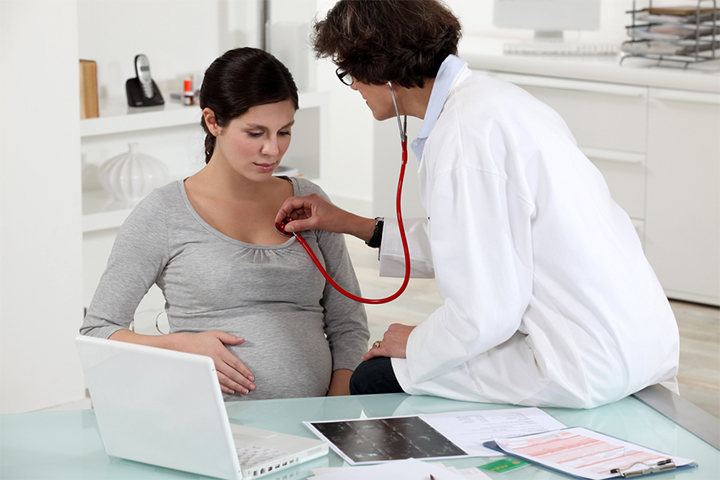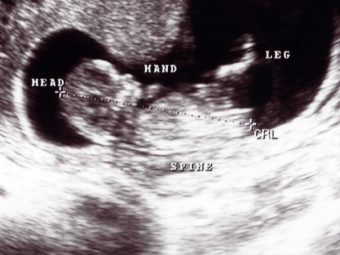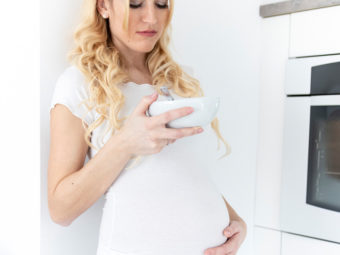
Image: ShutterStock
Pneumonia during pregnancy, also referred to as maternal pneumonia, can adversely affect you and the baby if not treated on time. However, with proper medical treatment at the correct time, the symptoms can be treated and the risks averted.
Read on to know more about maternal pneumonia, its causes, symptoms, treatment, and preventative measures.
What Is Pneumonia?
Pneumonia is a bacterial, viral, or fungal (rare) infection of one or both lungs. The lungs are inflamed and become less elastic, thus creating breathing difficulties. The air sacs (alveoli) are inflated with pus or fluid (1).
Pneumonia cases are usually reported during the winter, with the damp climatic conditions acting as a catalyst for microbes to survive.
Pulmonary edema is another condition in which there is fluid build-up in the lungs. However, pulmonary edema is not caused by infection.
Causes Of Pneumonia During Pregnancy
Pneumonia is usually triggered by cold climate. It usually occurs during the rains and winters and starts with a common cold or flu. A condition called chorioamnionitis in the mother can also cause neonatal sepsis and neonatal pneumonia. You could get pneumonia during pregnancy as you might have a weak immune system and also because of the reduced lung capacity due to the pressure put by the expanding uterus. These make you susceptible to pneumonia, which could be of the following types (2) (3).
- Bacterial pneumonia: It is the leading cause of pneumonia that develops either on its own or following viral flu or cold. It mostly affects one lobe or a part of the lung. Some of the common bacteria that cause this pulmonary infection are Streptococcus pneumoniae, Mycoplasma pneumoniae, and Haemophilus influenzae.
- Viral pneumonia: Viruses enter the lung cells and multiply. Infection with viruses such as influenza A and B, respiratory syncytial virus, coronavirus, adenoviruses, and parainfluenza viruses may lead to pneumonia.
- Fungal pneumonia: This is a rare form of pneumonia during pregnancy, and mostly caused by the fungus Coccidioidomycosis, in the third trimester.
Pregnant women are not likely to get pneumonia more often than non-pregnant women (3). Therefore, the risk factors of pneumonia are the same in pregnant and non-pregnant women. If they get pneumonia, it can be slightly more complicated because of the weak immune system. In extreme cases, pneumonia could also result in sepsis or septic shock.
Factors That Increase The Risk Of Pneumonia During Pregnancy
Image: Shutterstock
You are likely to contract pneumonia if you (4) (5):
- Have anemia or lung diseases like asthma
- Are using antepartum corticosteroids (given to improve fetal lung maturity) or tocolytic agents (to help induce labor)
- Smoke, drink regularly
- Have poor nutrition
- Work with young children (who could be the carriers of the infection)
- Frequently visit or spend time at hospitals and nursing homes
Signs and Symptoms Of Pneumonia During Pregnancy
Image: Shutterstock
Just like the risk factors, the symptoms of maternal pneumonia are also the same as those of pneumonia. Common symptoms include (6):
- Cold and/or flu associated with a sore throat, headache and body pains
- Fever and chills
- Cough that gets severe
- Chest pain
- Breathing difficulties or rapid breathing
- Excessive fatigue
- Vomiting
- Loss of appetite
If you have these symptoms, visit a doctor. It is good to treat pneumonia at the beginning because untreated pneumonia in pregnant women might lead to maternal or fetal complications in pregnancy. It is recommended to seek immediate emergency care if you have a high fever, chest pain, confusion, and lack of fetal movements.
Jamie Nicole, a single working mother of two shares the symptoms she experienced before being diagnosed with pneumonia at 15 weeks of her pregnancy. She says, “I had a fever that was over a hundred and one for two days plus I was coughing. My chest was hurting and I was just feeling really weak and really tired (i).”
Complications Of Pneumonia While Pregnant
Research studies have associated pneumonia during pregnancy with increased maternal morbidity and mortality (7). Severe or neglected pneumonia might lead to complications in the mother and the baby.
For the mother:
- Oxygen levels fall as the lungs cannot produce enough oxygen (hypoxia). This could lead to congestion where fluids accumulate around the lungs, and the infection may spread to other parts of the body, including the bloodstream. It may also lead to a collection of pus in the pleural cavity, also called empyema (4).
- May lead to miscarriage in early pregnancy
- If you have a history of heart disease such as congestive heart failure, pneumonia could complicate matters.
- Women with pneumonia may have a higher risk of several birth complications such as low birth weight, preterm birth, cesarean section, and pre-eclampsia.
Image: Shutterstock
- Respiratory failure (2)
For the baby:
- Low birth weight
- Premature birth
The seriousness of the complications necessitates early diagnosis and treatment of pneumonia during pregnancy.
 Did you know?
Did you know?Diagnosis Of Pneumonia During Pregnancy
Image: Shutterstock
Before coming up with treatment options, your doctor might (8):
- Assess your symptoms and health history
- Examine your lungs using a stethoscope
- Take chest x-ray
- Collect the sputum sample (phlegm or spit)
If the pneumonia is mild, the doctor might prescribe some antibiotics and suggest you take rest at home. But if the infection is severe, they might recommend hospital treatment.
Treatment Of Pneumonia During Pregnancy
Image: Shutterstock
Your healthcare provider will advise a course of medication that could steadily alleviate your symptoms. Antibiotics are given for bacterial pneumonia and antiviral medications for early-stage viral pneumonia (9).
- Mild pneumonia can be treated at home with enough sleep, fluids, and prescribed medications.
- If you have severe symptoms, you might be given intravenous fluids and antibiotics through a drip, and also oxygen for breathing normally. You may need hospital admission in this condition.
- In the case of severe pneumonia, you may be kept in the intensive care unit (ICU) and might require breathing assistance.
Irrespective of the type of infection, you may be advised to have:
- Respiratory therapy to ease breathing difficulties
- Oxygen therapy if the oxygen levels drop
- Nebulization and inhalers to reduce signs of wheezing and shortness of breath
- Over-the-counter pain relievers such as Tylenol (acetaminophen) for fever and pain
 Quick fact
Quick factIs It Possible To Prevent Pneumonia During Pregnancy?
Though you cannot prevent all types of pneumonia, you can take steps to lower the chances of contracting the infection by taking the following measures:
- Avoid physical contact with those having a cold, flu, or other infections
- Exercise regularly (that helps build immunity)
- Practice good hygiene
- Eat healthily and get adequate sleep
- Quit smoking
- Avoid places susceptible to bacteria, viral, and fungal pathogens
Frequently Asked Questions
1. Can a baby get pneumonia in the womb?
A few studies have demonstrated a vertical pneumonia transmission from the expectant mother to her unborn baby. Certain risk factors, such as premature membrane rupture, may increase the chances of the fetus acquiring the infection in the womb (10) (11).
2. Can pneumonia go away on its own?
In most cases, mild pneumonia may not complicate the pregnancy and is manageable with home care and timely treatment. However, sometimes it could be complicated and severe due to predisposed health conditions, including obesity and gestational diabetes (7).
3. How long does it take for pneumonia to go away?
According to the NHS, with timely diagnosis and appropriate treatment, the symptoms of pneumonia may start to decrease by three months. Nevertheless, you may still feel the weakness for some days. By six months, most people can recover completely (9).
Pneumonia in pregnancy may occur in women because of their weak immune systems and reduced lung capacity. However, factors such as anemia, smoking, and poor nutrition may increase its risk. If you have pneumonia, you may experience fever, chest pain, breathing difficulties, and fatigue. It is crucial to seek immediate medical attention to reduce respiratory distress, respiratory failure, or miscarriage complications. Mild pneumonia is treated at home with good sleep and medications, while severe form needs antibiotics and breathing assistance. Nebulization and inhalers reduce wheezing and help in faster recovery. However, it is better to prevent pneumonia through good hygiene and nutritious food. Taking flu vaccines may also reduce pneumonia complications.
Infographic: Signs And Symptoms Of Pneumonia During Pregnancy
Severe or untreated maternal pneumonia may cause serious complications to the pregnant woman and her unborn baby. Therefore, learn about the typical symptoms of pneumonia from this infographic and seek immediate medical care if you experience them during pregnancy. Illustration: Momjunction Design Team
Key Pointers
- Pneumonia refers to a lung infection caused by bacteria, viruses, or fungi.
- Pregnant women are more susceptible to pneumonia due to their compromised immune systems and smaller lungs.
- Pneumonia can lead to complications for both the mother and fetus, such as low birth weight, respiratory failure, decreased oxygen levels, and premature delivery.
- Risk factors for pneumonia during pregnancy include asthma or anemia, use of corticosteroids or tocolytic medications, and exposure to young children.
- Common signs of pneumonia during pregnancy include sore throat, headache, body aches, breathing difficulties, vomiting, and loss of appetite.
Personal Experience: Source
MomJunction articles include first-hand experiences to provide you with better insights through real-life narratives. Here are the sources of personal accounts referenced in this article.
i. Pregnancy vlog week 15 | I’m in the hospital with pneumonia;https://www.youtube.com/watch?v=8bLP8EM8NMs
References
1. Pneumonia – Women’s health guide; U.S. Department of Veterans Affairs (2015)
2. Goodnight WH and Soper DE; Pneumonia in pregnancy; Crit Care Med (2005)
3. Vanessa R. Laibl et al.; Influenza and pneumonia in pregnancy; Clinics in Perinatology (2005)
4. W S Lim et al.; Pneumonia and pregnancy; BMJ Journals
5. Who gets pneumonia; Pneumonia Biology
6. Pneumonia; The University of Utah
7. Graves CR; Pneumonia in pregnancy; Clin Obstet Gynecol (2010)
8. Vanessa R. Laibl and Jeanne S. Sheffield; Influenza and Pneumonia in Pregnancy; Elsevier Saunders Clinics In Perinatology
9. Treatment – pneumonia; NHS (2016)
10. Benedikt M Huber et al., Vertical Transmission of Mycoplasma pneumoniae Infection (2018); Neonatology.
11. Johan G. et al., Neonatal Pneumonia; Pediatric Radiology (Third Edition), (2009)
12. Pingping Tang et al.; Characteristics and pregnancy outcomes of patients with severe pneumonia complicating pregnancy: a retrospective study of 12 cases and a literature review; BMC Pregnancy and Childbirth (2018)























